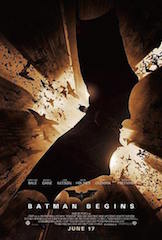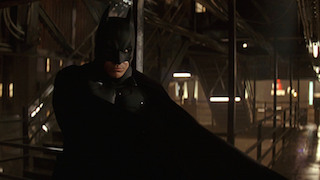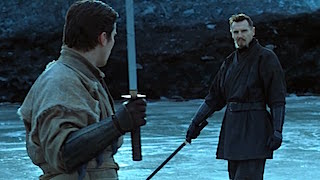 Take a moment to think about how long Batman has entertained us. When he first appeared on the scene, our grandparents were kids picking up his comic books at their local shop for a dime. Today, 76 years later we’re anxiously anticipating his fourth on-screen adaptation. He is an undeniable character that seems to have enough staying power for the next 100 years. Now take a moment to remember that Batman is a vigilante.
Take a moment to think about how long Batman has entertained us. When he first appeared on the scene, our grandparents were kids picking up his comic books at their local shop for a dime. Today, 76 years later we’re anxiously anticipating his fourth on-screen adaptation. He is an undeniable character that seems to have enough staying power for the next 100 years. Now take a moment to remember that Batman is a vigilante.
Sure, Batman works with the police to bring bad guys to justice. He doesn’t kill anyone, and he follows a certain code. But he is decidedly outside the law. If someone in our real world was beating up “bad guys” and taking the law into his or her own hands, most of us might inwardly cheer them on but probably wouldn’t condone actual vigilantism. Wisely, the better Batman writers have approached this subject over the years, just as Batman Begins does. The film starts a trilogy that tackles the causes and effects of vigilantism, examining our championing of such a man.
I never knew a Batman film could be this good before I caught this one in the theater. I was the kid that the candy coated Batman Forever was made for. But this was something altogether different. I believe it is the best Batman movie by miles, even better than the often more critically acclaimed The Dark Knight. Because this is truly the only film about Batman. The other films are about things outside of Batman- the villains, mainly. The Dark Knight is more about Gotham finding the hero it needs amidst chaos, and Batman is just one of the candidates. The spotlight is cast more squarely on Bruce Wayne and Batman in this film than in any other.
Carmine Falcone: This is a world you don’t understand. And you always fear what you don’t understand.
 This movie is about fear and what it creates (spoiler: it creates Batman!) As we’re reminded in the film by Thomas Wayne, all creatures experience fear. Even (and especially) the scary ones. Fear drives a response in all of us; we act upon the fear in some way whether it is to run or fight or scream, etc. Prolonged fear often establishes within us an ideal, for better or worse. In Bruce Wayne, it establishes a moral compass bent on fighting injustice. The spinning of this compass is what makes the character interesting to watch, and as we see here, it first leads him to the League of Shadows, an organization built on fear-based control.
This movie is about fear and what it creates (spoiler: it creates Batman!) As we’re reminded in the film by Thomas Wayne, all creatures experience fear. Even (and especially) the scary ones. Fear drives a response in all of us; we act upon the fear in some way whether it is to run or fight or scream, etc. Prolonged fear often establishes within us an ideal, for better or worse. In Bruce Wayne, it establishes a moral compass bent on fighting injustice. The spinning of this compass is what makes the character interesting to watch, and as we see here, it first leads him to the League of Shadows, an organization built on fear-based control.
“For God gave us a spirit not of fear but of power and love and self-control.”- 2 Timothy 1:7
The broad scope of Carmine Falcone’s words applies to us all. This world is broken, and often hard to understand. We could live in fear every day of our lives. But theologically we stand on the basis that we have been given a spirt of love and self-control that is far more powerful than fear, thus fear does not control us. I wrote in my Batman Forever review that Batman is more a model of a Christian than Christ. His fear does not control him. Though it haunts him, it spurs him to action he believes is inherently good. The question we need to ask is- is it actually good, or is just his version of right vs wrong?
The film displays what is now becoming a common trope for modern movie villains. They don’t twirl their mustaches (but boy does Ducard have a majestic mustache for twirling). Rather, they believe they are doing good just like our hero. The shades of gray between them and Batman can be hard to distinguish. This is the perfect example of why the gospel should never be reduced to a matter of right and wrong. The gospel is about good and evil.
 Right and wrong vary by the individual. Good and evil, however, are undeniable. Your version of right may be wrong to me, but what matters is where it leads- is it good or is it evil? The League of Shadows believe they are right in destroying Gotham. Obviously this version of right leads to evil. Batman believes he is right by beating bad guys to a pulp. Questionable as it is, it does lead to good. The rub is, vigilantism also leads to evil. Enter the Joker, and so continues the inward Batman dilemma.
Right and wrong vary by the individual. Good and evil, however, are undeniable. Your version of right may be wrong to me, but what matters is where it leads- is it good or is it evil? The League of Shadows believe they are right in destroying Gotham. Obviously this version of right leads to evil. Batman believes he is right by beating bad guys to a pulp. Questionable as it is, it does lead to good. The rub is, vigilantism also leads to evil. Enter the Joker, and so continues the inward Batman dilemma.
Henri Ducard: If you make yourself more than just a man, if you devote yourself to an ideal, and if they can’t stop you, then you become something else entirely.
The right and wrong morality game gets people hurt fast and can often breed evil. But God is good, and all good is God. It’s an important distinction to make. It’s why the apostle Paul illustrated followers of Christ as “more than conquerors.” Ducard was hitting at this idea of becoming more than our humanity, misguided as his logic was. Condemnation comes to us all, but if God is for us, who can be against us? Batman is a conqueror. But we are more than that in Christ. Fear doesn’t have to control us, and good will prevail despite our ideas of right and wrong. It might not look as cool as driving a tumbler or wearing a cape, but it is eternal.


